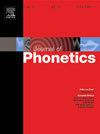Lexically-guided perceptual recalibration from acoustically unambiguous input in second language learners
IF 2.4
1区 文学
0 LANGUAGE & LINGUISTICS
引用次数: 0
Abstract
The present study investigated whether advanced late second-language (L2) learners adapt their perceptual categorization in response to categorical segmental substitutions in L2 words, and whether this differs depending on the difficulty of the targeted phonological contrast. In three experiments, German learners of English categorized acoustic continua for a contrast that also exists in their L1 (/i/-/ɪ/), and one that does not and is known to be challenging for them (/ɛ/-/æ/). Crucially, they did so after listening to sets of English words that were either all canonically produced or contained items with /ɪ/ [i] and /æ/ [ɛ] substitutions. Experiment 1 used the same male talker for exposure and test, Experiment 2 another male test talker with similar acoustics and Experiment 3 a female test talker. Results showed perceptual recalibration effects in the expected direction for /i/-/ɪ/ in Experiments 1 and 2, and a shift in the opposite direction for /ɛ/-/æ/ only in Experiment 1. This study extends previous findings to a non-native population and to vowel distinctions, provides novel insights on the cross-talker generalizability of perceptual recalibration effects and, importantly, highlights the need for more research investigating perceptual adaptation processes involving difficult non-native contrasts.
第二语言学习者在词汇引导下从声音无歧义输入中进行知觉再校准
本研究调查了晚期高级第二语言(L2)学习者是否会调整他们的感知分类,以应对 L2 单词中的分类分段替换,以及这种调整是否会因目标语音对比的难度而有所不同。在三项实验中,德语英语学习者对其母语中也存在的对比(/i/-/ɪ/)和不存在且对他们来说具有挑战性的对比(/ɛ/-/æ/)进行了声学连续性分类。最重要的是,他们是在听了几组英语单词之后才这样做的,这几组单词要么都是标准发音,要么包含/ɪ/ →[i] 和/æ/ →[ɛ]的替换词。实验 1 使用了同一个男性说话者进行暴露和测试,实验 2 使用了另一个具有类似声学效果的男性测试说话者,实验 3 使用了一个女性测试说话者。结果显示,在实验 1 和 2 中,/i/-/ɪ/ 的知觉重新校准效果与预期方向一致,而只有在实验 1 中,/ɛ/-/æ/ 的知觉重新校准效果与预期方向相反。这项研究将以前的发现扩展到了非母语人群和元音区分,为知觉重新校准效应的跨语言泛化提供了新的见解,而且重要的是,它强调了对涉及困难的非母语对比的知觉适应过程进行更多研究的必要性。
本文章由计算机程序翻译,如有差异,请以英文原文为准。
求助全文
约1分钟内获得全文
求助全文
来源期刊

Journal of Phonetics
Multiple-
CiteScore
3.50
自引率
26.30%
发文量
49
期刊介绍:
The Journal of Phonetics publishes papers of an experimental or theoretical nature that deal with phonetic aspects of language and linguistic communication processes. Papers dealing with technological and/or pathological topics, or papers of an interdisciplinary nature are also suitable, provided that linguistic-phonetic principles underlie the work reported. Regular articles, review articles, and letters to the editor are published. Themed issues are also published, devoted entirely to a specific subject of interest within the field of phonetics.
 求助内容:
求助内容: 应助结果提醒方式:
应助结果提醒方式:


